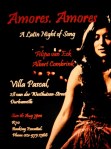
Our programme includes the famous and very popular “La Partida” (The Farewell) by Marcello Alvarez (1833?-1898). This beautiful song shows off the dramatic and vocal range of a singer and pianist, and makes an excellent recital-piece that has been recorded and performed by many great singers of the past and present. Alvarez is known for the composition of almost 100 songs and an unpublished opera “Margarita”. He also composed an orchestral work “Obertura Capricho” (Keith Johnson – All Music Guide)
The text by Spanish poet, playwright and journalist Eusebio Blasco Soler (1844 – 1903) tells of a person leaving their homeland with a heart full of sadness and even bitterness.
La Partida (The Farewell) – Eusebio Blasco Soler
Spanish Text:
Sierras de Granada, montes de Aragón,
campos de mi patria,
para siempre adios
De la patria los últimos ecos,
resonando en mi pecho estarán
y mis ojos llorando pesares
sus dolores, ¡ay! sus dolores
al mundo dirán.
Mensajeros, ¡ay! mensajeros
de un pecho traidor. ¡Ah!
Cuando a tus playas vuelva suelo adorado
las aguas del olvido me habrán curado
y si así no sucede ¡triste de mí! ¡triste de mí!
A la patria que dejo vendré a morir.
Sierras de Granada, montes de Aragón,
campos de mi patria, para siempre adiós,
adiós, para siempre adios!
La Partida (The Farewell)
Eusebio Blasco Soler – Free English translation by Albert Combrink:
Mountain ranges of Granada, mounts of Aragon, fields of my mother country, goodbye for ever.
The final echoes resonating in my chest, will be of mother country and my eyes will be crying with grief, ay! And will speak its pains to the world.
Messengers, ay! Messengers, ay, of a traitorous heart. Ah!
When to the beaches of your adored ground, I return, the waters of forgetfulness will have cured me of my grief. And if it has not, woe is me! Woe is me!
To the mother country that I leave, I will return to die.
Mountain ranges of Granada, mounts of Aragon, fields of my mother country, for always, goodbye!
Musical Style
The free lyricism and easy melodiousness of the song resembles the style of Italian Neapolitan Songs. The passion of the poet is reflected in the flamenco style ornaments of the vocal line. The work also reflects the omnipresence of the guitar in the music of Spain and Latin America. Arpeggiated figures remind of a strummed guitar. When built into an extended song such as this one feels that it would not be out of place as an aria in a Zarzuela. Zarzuela is a Spanish lyric-dramatic genre that includes spoken dialogue and sung scenes (similar to musicals or German Operetta). Music in a Zarzuela can include dance, popular or operatic songs. There are two main forms of Zarzuela: the Baroque Zarzuela (c.1600-1750) and the Romantic Zarzuela (c.1850-1950). Zarzuela spread to the Spanish colonies and many Hispanic countries such as Cuba, developed their own traditions, extending the range and scope of this artform. While I found no affirmative documentation it is not far fetched to assume that Alvarez would have encountered Zarzuelas in Brazil or on travels to Spain, which many musicians from Brazil did in the 19th century.
Useful links and recorded material
An orchestrated version sung in 1959 by Spanish tenor Alfredo Kraus (1927-1999). The last two years of Kraus’s life were darkened by the death of his wife in 1997, which affected him so deeply that he stopped performing for eight months. A proud and strong-willed man, he eventually returned to the stage and to teaching, making the comment: “I don’t have the will for singing but I must do it, because, in a sense, it is a sign that I have overcome the tragedy. Singing is a form of admitting that I’m alive.” Something of that will to live can be heard in his performance of this song.
An orchestrated version sung by Peruvian tenor Luigi Alva(1927- ). Alva was the foremost tenore leggiero of the post World War II years. He was known for his purity of tone, elegant phrasing and spotless diction. The clarity and precision he brought to Mozart and Rossini serves him well here in the lyrical sections of this song, sung with touching expression.
Another famous tenor to have recorded “La Partida” is Enrico Caruso (1873-1921) He brings a real dramatic flair and his powerful voice to this song creating a superb rendition. A very exciting discovery while researching this song was finding FREE DOWNLOADS of Caruso recordings of copyright-free material in the public domain. But for those who wish to own the artefact, there are recorded CD versions available by Rosa Ponselle and Caruso.
The operatic possibilities of “La Partida” are explored in this version by Amelita Galli-Curci on what appears to be her first ever recording (30 October 1916). She not only adds a high D at the end, but also what sounds like a pair of Castanets. One wonders if the great lady herself played them, or if the task was left to the percussion department… It was not uncommon for singers such as Maria Malibran to play Castanets on stage (in Carmen for example or in song recitals) or even accompany themselves on the guitar (Victoria de los Angeles). Filipa van Eck however will not be playing any of these at our performance of “Amores, Amores, a Latin Night of Song” on 16 August at Villa Pascal, being satisfied with myself on the piano, accompanying the songs as well as performing solo instrumental repertoire.
Other items on the programme include Falla’s “Seite Canciones Populares Espanolas”, Claudio Santoro’s “Acalanto al Rose”, “La muerte del Angel” by Astor Piazzolla as well as Villa-Lobos songs and piano works.



Leave A Comment
You must be logged in to post a comment.